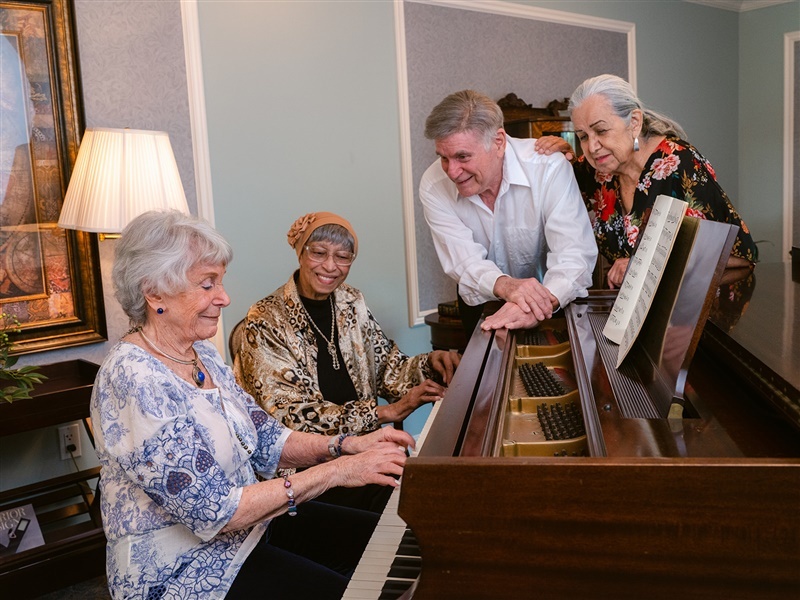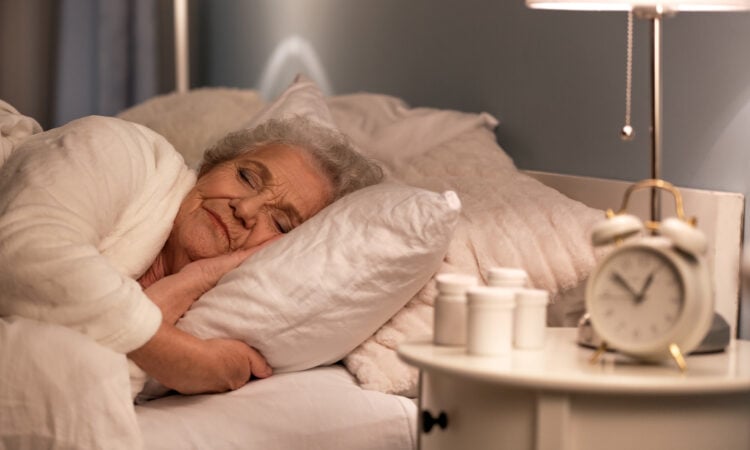Hollenbeck Palms
How music can improve the lives of older adults

Beginning at an early age, people begin to experience the healing and uplifting power of melody, rhyme, and song. Life’s soundtrack constantly shuffles. One day, a simple repeated lullaby eases the minds of young children. Later in life, the complexities and whirlwind of jazz music can alter moods, perceptions and even time. Sometimes, music can motivate us to work out. Other times, music can help people study or focus. Music is also a loyal companion in celebration or defeat.
For older adults, the benefits of therapeutic music are far-reaching and life-enhancing. Music is known to improve memory and mental functions in individuals dealing with Alzheimer’s disease, dementia symptoms and other neurodegenerative conditions.
This phenomenon of music’s deep connection and power to awaken hearts and minds was captured in a stunning viral video featuring an elderly woman, the late Marta Cinta González Saldaña. At the start, she is perched in a chair and her eyes downcast. But as the swelling notes of Tchaikovsky’s Swan Lake fill the room, her hands flutter, her eyes widen, and her arms gracefully sway and rise in triumph. Her battles with cognitive and physical decline fade below the flow of music. It was as if the former ballet dancer was unlocked and renewed through music, even if just in that moment.
Music as Therapy
In a senior living community, a symphony of musical activities can work wonders. Music can be prescribed to residents as an effective alternative remedy during rehabilitation for post-stroke symptoms, for example. These exercises are designed to help move alongside a rhythmic beat, alleviating pain and improving gait in the long term.
For mental health and to ease anxiety in people with dementia symptoms or Alzheimer’s disease, music as medicine can provide an escape from gloomy sentiments and sunken moods. Music therapy also nourishes relationships among residents and staff members.
Dementia and Depression
A 2018 study demonstrated how music therapy significantly changed the lives of nursing home residents who were navigating dementia symptoms and depression. Residents received treatment with the help of music therapists and facility caregivers. The study revealed that depression symptoms decreased at a high rate in residents undergoing music therapy.
Brain Neural Circuitry
Listening to music can activate the brain’s neural circuitry. Many with Parkinson’s disease rely on therapy that is based on movement. The music patterns allow patients to retrain their control over motor movements, such as walking.
As mentioned above, in stroke survivors, music-assisted therapy increased people’s gait velocity, cadence and stride length. Patients also noticed better balance, better overall motor function and a higher quality of life as a result.
Lifelong Learning at Hollenbeck Palms

Our comprehensive and extensive Lifelong Learning program fulfills the educational, artistic and cultural needs of our residents.
We strive to meet the needs of every music lover who appreciates the beauty and necessity of music in daily life. Residents of Hollenbeck Palms can hear lecturers from local and national universities lead discussions about the history of music, along with other musical topics. We also offer regular musical programs, a favorite among residents. And our proximity to the Disney Concert Hall is yet another avenue for our residents to explore music and its many healing properties.
Highlights of the music offerings at Hollenbeck Palms include:
- Piano presentations and lectures
- Opera program in conjunction with LA Opera
- Hollenbeck Palms Chapel recitals
- Monthly performances at Hollenbeck Palms Rose Parlor
Our vibrant community and comprehensive care offerings at Hollenbeck Palms put wellness and happiness in retirement life on repeat for all its residents.
If you are interested in learning more about our Hensel Memory Enhancement Center, a premier Los Angeles dementia care center,
email: [email protected] , or call us at (323) 307-4505.


